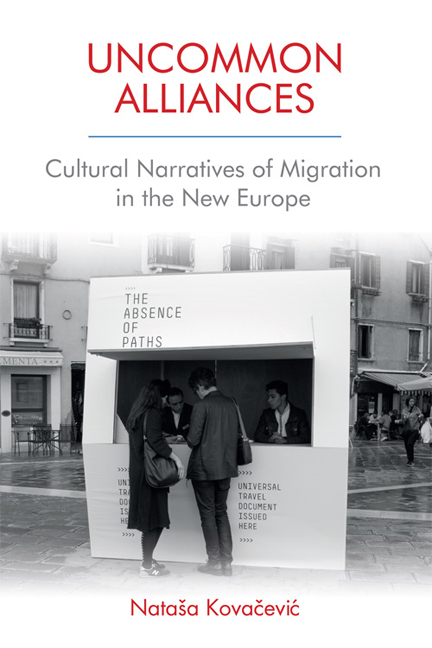Book contents
- Frontmatter
- Contents
- Acknowledgements
- Dedication
- Introduction
- 1 Performing the State: Artistic Re-Presentations of European Community
- 2 Alternative Hospitalities on the Margins of Europe
- 3 Colonial Spectres in Europe’s Historiography
- 4 Postcolonial and Postcommunist Contact Zones in a United Europe
- 5 Epilogue: Memories of Yugoslavia and Europe to Come
- Notes
- Bibliography
- Index
Introduction
Published online by Cambridge University Press: 01 May 2021
- Frontmatter
- Contents
- Acknowledgements
- Dedication
- Introduction
- 1 Performing the State: Artistic Re-Presentations of European Community
- 2 Alternative Hospitalities on the Margins of Europe
- 3 Colonial Spectres in Europe’s Historiography
- 4 Postcolonial and Postcommunist Contact Zones in a United Europe
- 5 Epilogue: Memories of Yugoslavia and Europe to Come
- Notes
- Bibliography
- Index
Summary
In China Mieville's The City and the City (2009), policing citizens to ‘unsee’ one another is the only way to differentiate between Beszel and Ul Qoma, two cross-hatched cities that exist in the same space. Such ‘unseeing’ is repeatedly threatened by underground rumblings about the cities’ potential unification and even by the rumoured existence of a shared in-between: the third city of Orciny. Nonetheless, such possibilities remain mythical and inconclusive. In fact, all theories of unification in this novel are necessarily a chimera, relying on the nostalgia for a ‘pre-Cleavage’ time that never was: even the historically remote event of Cleavage is never conclusively defined as an act of either joining or separation. Mieville's deliberately deconstructive use of the term cleavage to signify both joining and separation suggests that what divides the cities is also what they have in common. They exist as long as they can perpetuate the myth of circumscribed identities within neatly demarcated boundaries, which gesture to the city that lies beyond.
The specific dynamic that Mieville depicts in the novel suggests a post-Cold War cleaving of Europe and its peripheries along the lines spelled out by neo-liberal capitalist restructuring and movement of labour. Cleaving as a project of both erasing and creating real and symbolic borders marked a traumatic rift at the heart of the European unification project, too, ‘unseen’ by the idealistic proponents of its rhetoric. While Mieville's Bezsel is technologically outdated, geopolitically isolated and economically depressed, the more glittering Ul Qoma is the poster child of neo-liberal development: confident, dynamic, attracting foreign investment and awash in consumer goods. This situation metaphorically captures intimate social inequalities of neighbouring Balkan states; contiguous Western and Eastern European states; and cross-hatched citizen-immigrant, wealthy-impoverished spaces throughout European metropolises. It is irreducible to any of these coordinates; rather, its different manifestations must be thought together to cognitively map the logic of borders in a tenuously unified Europe.
In The New Old World, Perry Anderson castigates self-satisfied European elites who choose to ‘unsee’ these proliferating inequalities and instead praise the European Union's idealised image, which hovers above its members like the mythical possibility of the city of Orciny: ‘the Union is now widely presented as a paragon for the rest of the world, even as it becomes steadily less capable of winning the confidence of its citizens’ (2009: xv).
- Type
- Chapter
- Information
- Uncommon AlliancesCultural Narratives of Migration in the New Europe, pp. 1 - 32Publisher: Edinburgh University PressPrint publication year: 2018



